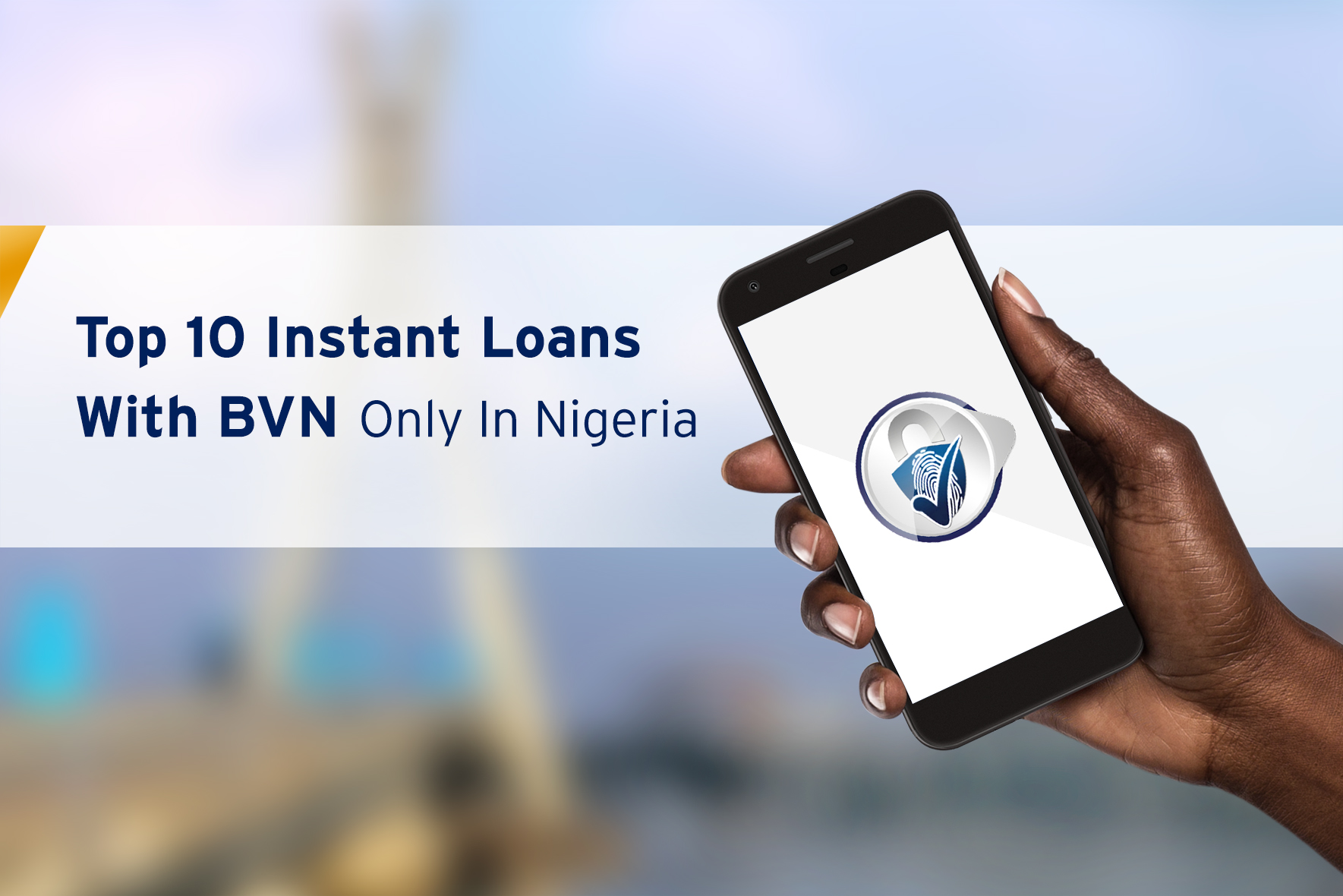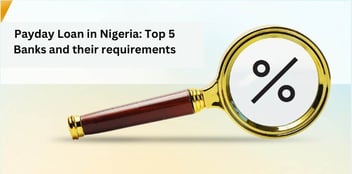
Top 10 Instant Loans With BVN Only in Nigeria
Author Eyitemi Efole
In getting instant loans in Nigeria, the BVN has become a necessity, hence the need to know the top 10 instant Loans with BVN only in Nigeria. The Bank Verification Number, commonly called BVN, is a biometric identification system implemented by the Central Bank of Nigeria to curb or reduce illegal banking transactions in Nigeria.
One of its major uses is to help reduce fraud, increase the efficiency of banking operations, and enable customer access to credit facilities. In Nigeria today, there is no reputable loan app in Nigeria that disburses loans without a BVN. Any platform that offers loans in Nigeria without requiring a BVN is often regarded as fraudulent. Unfortunately, loan application fraud is more prevalent today than it used to be. That is why Nigerian loan apps need identity verification. If you do not provide your BVN, all genuine loan apps in Nigeria will deny you service.
 Tap. Download. Solve Your Money Needs – Try FairMoney.
Tap. Download. Solve Your Money Needs – Try FairMoney.
Why is the BVN important to getting loans in Nigeria?
The BVN database is one of the most efficient and secure tools that loan apps can use to verify a customer’s identity and personal information. As a result, loan organisations in Nigeria require applicants to present a BVN to avoid fraud and identity theft.
As part of their requirement for granting borrowers money in minutes, lenders ask for the BVN to confirm their identity. This provides them with a form of safety net since they can use the BVN to check the validity of your personal information.
A BVN however cannot be used to access any bank account or be used to pay money into or collect money from any account by itself. It is also used in tracking down defaulting borrowers and retrieving the funds owed from their bank accounts.
Accessing loans with BVN in Nigeria
Whether you are taking a secure loan or a loan without collateral, lenders will require details of your banking activities. That includes requesting your BVN as part of your personal information.
Listed below are loans borrowers can access using their BVN.
1. FairMoney
FairMoney requests for your BVN to verify your identity and make sure you didn’t default from other companies. FairMoney is a Nigerian-French company with European data security standards. It says that it never shares its customers’ BVN information with third parties.
2. Branch
A very prominent loan platform, the requirements for accessing loans on the Branch platform are simple. All borrowers need to apply is their phone number or Facebook account, BVN, and bank account number. It also requests access to the data on borrowers’ phones in order to build their credit scores.
3. Carbon
To verify the provided bank account, the Carbon loan app requires borrowers to submit their BVN. This is to ensure that their details cannot be used to apply for a loan without their authorization in the event that a 3rd party tries to breach their data.
4. Alat By Wema
To access a loan on Alat, an app operated by Wema Bank, intending borrowers are required to validate their BVN. They are also required to take a photo of their face and a photo of their signature. If the BVN facial match fails, a one-time password (OTP) will be sent to a new customer’s BVN phone number and used as an alternative for validating BVN.
5. Aella Credit
With Aella Credit, your BVN is requested to verify your ownership of the account information supplied. This is to ensure that your details cannot be used to apply for a loan by someone else.
The BVN is very sensitive information and as such it does not provide access to your account. Borrowers who have further concerns are advised to contact their banks before proceeding with the loan app.
6. QuickCredit
To qualify for a loan on QuickCredit, customers must maintain a minimum monthly lodgement of N20,000 or earn a minimum net monthly salary of ₦ 10,000. Customers must also not have any history of dud cheques and must have satisfactory credit reports. They are also required to fill in their BVN as part of their personal information.
7. PalmCredit
One of the reasons PalmCredit rejects loan applications is because of a wrong BVN-linked phone number. During registration, borrowers are expected to use the same phone number they used in registering their BVN because a one-time password (OTP) will be sent to that number for them to access the next stage of their registration. Failure to do so might result in their loan application not going further.
8. Lendigo
The Lendigo Loan App offers loans to Small Businesses, offering business owners easy, fast, and flexible access to working capital according to their business requirements and suited to their finance needs.
It does not require collateral, and borrowers can access up to ₦10m low-interest loans. Part of its requirement is the borrower’s BVN.
9. QuickBucks
QuickBucks is the Instant Loan Application from Access Bank. The application is available to both customers and non-customers of Access Bank. With QuickBucks, borrowers can payday loans, salary advance, small ticket personal loans, device financing, vehicle finance, or mortgages.
To access the loans, borrowers are required to download the app, click on signup, and enter their email address and BVN-linked phone number.
An OTP will be sent to the phone number which will be used to validate the app.
10. Specta
With Specta, a loan app in Nigeria from Sterling Bank, borrowers can access a personal loan of up to N5M without collateral in five minutes.
All the borrower needs is a bank account number and Bank Verification Number (BVN). Visit nairaCompare to compare and apply for loans in Nigeria. Click the button below!
How banks retrieve loans using BVN
In 2019, the Central Bank of Nigeria (CBN) activated the Global Standing Instruction (GSI) policy allowing banks to withdraw defaulting loans from any account held by a borrower.
The CBN says the GSI policy will facilitate improved credit repayment culture in the country; reduce non-performing loans (NPLs), and promote watch-listing of chronic loan defaulters in the Nigerian Banking System. The policy is also to promote a sound financial system and enhance loan recovery across the Nigerian banking sector. It was approved by the Bankers’ Committee on February 18, 2020.
On July 13, 2020, the Financial Policy and Regulation Department of the CBN issued a circular to all banks and other financial institutions announcing the operational guidelines for the new policy for individual bank customers in the country.
To regulate the effective implementation of the GSI process, including eligible loans granted by banks from August 28, 2019, the CBN issued the guidelines for all banks and other financial institutions.
Under the GSI, it is no longer possible for a bank customer to take a loan or credit from one bank and refuse to pay it back while continuing to maintain several other accounts in other banks with enough credit balance that could have paid back the debt of the first bank.
With the new policy, if a bank customer or account holder is granted a loan or credit by a bank, and defaults in paying back, the said bank can contact any other bank(s) in the country where the defaulting customer holds an account(s) with a credit balance that is enough to offset the full value of the loan or credit and recover the loan or credit from there.
The GSI is a last resort by a creditor bank to recover its loan or credits. The types of accounts affected by the GSI policy include individual customers’ savings and current accounts; individual domiciliary accounts; investment or deposit accounts (Naira & foreign currency-denominated), and electronic wallets held by the customers.
Even if these accounts are held jointly, any money found in them as credit balances would still be recovered, as long as they are linked to the affected customer’s BVN. With the policy, the borrower is responsible for ensuring that the terms and conditions of the mandate are clearly understood before execution.
Also, the borrower is responsible for ensuring that all qualifying accounts are linked to his/her BVN.
Where any of the borrower’s accounts are found not linked to his/her BVN, such BVN would be placed on a watchlist by the relevant anti-graft agencies, including the Economic and Financial Crimes Commission (EFCC).
About Author

Eyitemi Efole
Eyitemi Efole is exploring the marketing field, with a particular interest in brand management, strategy, and operations. She is keen on understanding how brands build trust and connect meaningfully with their audience.
.png?width=1615&height=444&name=nairaCompare%20Christmas%20logo%20(PNG).png)








